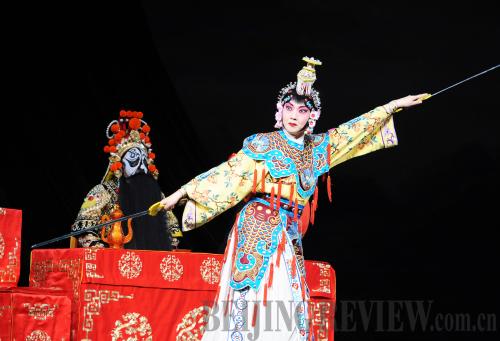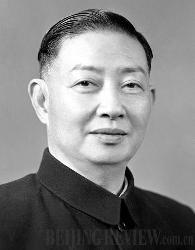|
 |
|
FEMININE STRENGTH: Peking Opera actress Shang Wei (right) performs in Farewell My Concubine during a rehearsal on August 27 in Washington, D.C. (CNSPHOTO) |
Double jiazi
Hosting the celebration is the master's youngest child, Mei Baojiu, who is himself a famous Peking Opera singer and leader of the Mei Lanfang Peking Opera Troupe in Beijing. The 120th birthday celebration is significant, said Mei Baojiu, because it represents two 60-year celestial cycles in the Chinese calendar, or a "double jiazi."
"This year is the time to commemorate my father and his U.S. performance tour in 1930. I am 80 years old this year and it is the 120th anniversary of my father's birth," he told Beijing Review.
"Back in 1930, my father started his first American tour from Seattle and had a successful trip in nine cities including San Francisco, Washington, D.C., New York City, and more. His performances impressed American audiences very much," he said. "Now standing in the lobby of the David Koch Theater, I can feel the same atmosphere and spirit of the opera performances as in 1930, when my father played in the theater on 49th Street in Manhattan."
Mei Lanfang is famous for his skill in performing, his son said, but his earnest wish for world peace, his noble character and his ambassadorship of Chinese culture left an indelible mark on the world. This tour aimed to memorialize those qualities, with an effort to teach and inspire as well as entertain.
Li Enjie, President of the Jingju Theater Co. of Beijing, said this tour was a special one for the troupe.
"The best way to promote Peking Opera around the world is to perform it on a market-oriented stage like the Lincoln Center, even if we don't make a profit this time," Li said.
Universal stories
Though Western audiences may not have a finely developed appreciation for the intricacies of Peking Opera, the thrilling storylines play well with all audiences. In The Goddess of Heaven Scatters Flowers, Dou plays the goddess Apsara, sent by Tathagata to comfort the sick Vimalakirti with a shower of petals. Dou, 29, said she first began to learn Peking Opera at the age of 4.
"As one of the third-generation successors of Mei Lanfang's performance art, I'm confident that New York audiences will understand what our performance conveys," said Dou. "Take the first play, The Goddess of Heaven Scatters Flowers, as an example: It is a story from Buddhism—a story about love. I think most of the audiences, from the East or the West, will enjoy it."
The stage on which these demanding parts were reenacted was suitably bare, with dramatic lighting and colorful costumes the center of attention. The pageantry was phenomenal, with layers of bright silk, long pheasant-feather headdresses, yards of flowing sleeves and metallic armor. It was bright, eye-catching and beautiful.
In Pierce the Mussel, Lian Jinfeng, played by the impish and charming Zhang Xinyue, is an enterprising young woman who dives into the ocean hunting for sea cucumbers to treat her sick mother. It is a story of gratitude and kindness. Such strong female leads are traditional in Peking Opera. In Resisting Jin Troops, the beautiful warrior Liang Hongyu leads her all-female troops against the hordes of Jin State fighters. Actress Li Hongyan, playing Liang, was fierce and confident. She spun and stabbed her spear at waves of approaching soldiers, deftly beating back each one while exhorting her armed female forces toward the battle. It was as exciting as any Shakespearean swordfight and the audience repeatedly broke into applause.
Even the court ladies of Mei Lanfang's world are strong, warrior-like women. In Farewell My Concubine, Lady Yu slits her own throat rather than being a liability to her beloved king, Xiang Yu. In Drunken Beauty, consort Yang Yuhuan has a party all by herself when she is spurned by her royal lover. Several goblets of wine later, she is still standing tall, even if wobbly on her feet.
Female characters, the dan role in Peking Opera, are traditionally played by men. Mei Lanfang was famous for playing these parts. The delicate movements and alluring side glances belay the strength of these women warriors, as though they were steel flowers with hidden thorns.
Following the New York and Washington, D.C. performances, the troupe will travel to Japan and Russia to entertain audiences and spread Mei Lanfang's vision of a peaceful world through art.
Mei Lanfang's gifts to the world more than 80 years ago are still relevant today. To inspire, teach and share a vision of global peace is the master's heritage, and he would be pleased to see his dream carried on by his descendants.
"The people of my country, the same as yours, desire peace among the nations," Mei Lanfang told audiences in 1930. "You have deigned to view our imperfect portrayals of China's ancient drama… and you have chosen me for this distinction, which is an expression of your friendship for my people."
Profile

Mei Lanfang (1894-1961) was born into a family of Peking Opera performers in Beijing. He made his stage debut at just 10 years old. He was most famous for playing female characters, or the dan role, in Peking Opera, with a distinctive style. Mei helped introduce Peking Opera to the world by taking performances to a number of foreign countries including Japan, the United States and European countries.
(Compiled by Beijing Review)
The author is a contributing writer to Beijing Review, with reporting by Huang Wei from New York City
Email us at: yanwei@bjreview.com | 